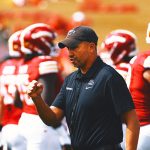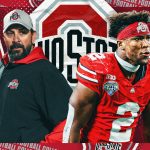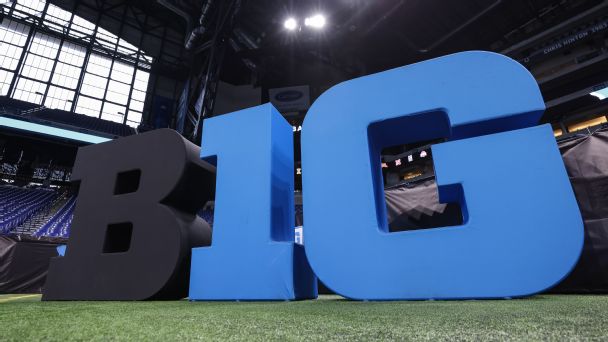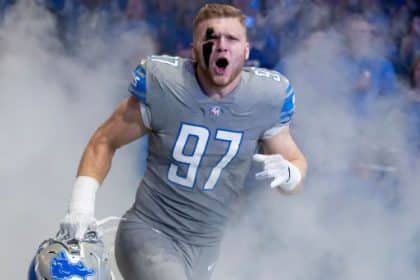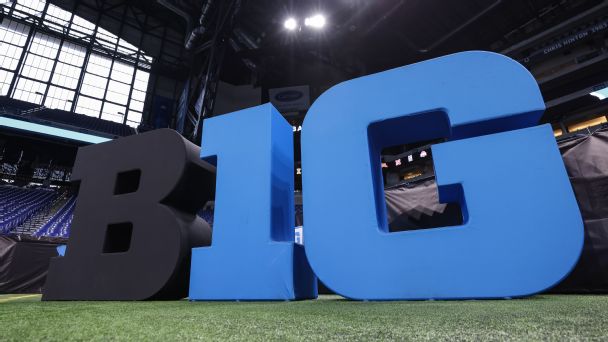
Power 5 media days will officially wrap up with the Big Ten on Wednesday and Thursday at Lucas Oil Stadium in Indianapolis.
With the entries of UCLA and USC still a year away, the focus will be on the conference’s historic blue bloods: How will Ohio State look with a new starting quarterback? Can Michigan, with coach Jim Harbaugh facing a potential four-game suspension to start the season, three-peat? And is the country overlooking Penn State?
All of those questions will be addressed this week, as well as Wisconsin‘s new-look offense, Nebraska under Matt Rhule in Year 1 and the conference’s best quarterbacks.
(Northwestern, after firing Pat Fitzgerald in the wake of a hazing scandal, will be represented by interim coach David Braun. Players Bryce Gallagher, Rod Heard II and Bryce Kirtz will not attend because they “did not want our participation to be dominated by the hazing issue and steal the focus away from football and the upcoming season.”)
Adam Rittenberg and Tom VanHaaren break down the Big Ten’s biggest on-field questions as the season draws closer.
How potent will Ohio State’s offense be without C.J. Stroud at quarterback?
Adam Rittenberg: Still very potent. Coach Ryan Day has elevated Ohio State’s production on offense, especially at quarterback, since his arrival in 2017. He has produced three consecutive NFL first-round draft picks in Dwayne Haskins Jr., Justin Fields and Stroud, and there’s little reason to doubt what he can do with Stroud’s successor. Kyle McCord, a former ESPN top-35 recruit, has patiently waited his turn and will enter preseason camp as the favorite to win the job. Ohio State will return the nation’s premier wide receiver group, led by Marvin Harrison Jr. and Emeka Egbuka, and talented running backs looking to bounce back from an uneven year. The key could be the offensive line, which lost tackles Paris Johnson Jr. and Dawand Jones to the NFL and must remain a strength. Ohio State has the players, coaches and scheme to remain one of the nation’s top offenses.
Tom VanHaaren: Losing a first-round quarterback is never a positive, but Day has been in this position before, where he needed to replace a productive quarterback. I remember when Kyle McCord committed to Ohio State out of high school, thinking that he would eventually be a great option at quarterback for the Buckeyes. I still think he’ll be a great option, especially with Harrison Jr. to throw to. They were teammates in high school and already had chemistry — Harrison caught 37 career touchdowns during his high school career. He’s in a quarterback competition with Devin Brown, but McCord has a good shot at winning the job. As Adam mentioned, I think the run game will be improved this season as long as both TreVeyon Henderson and Miyan Williams stay healthy. It might take a few games to gear up and get used to the new players, but I think Ohio State will remain as one of the top offenses in the country in 2023.
What does the Wisconsin offense look like under Luke Fickell and offensive coordinator Phil Longo?
Rittenberg: Wisconsin fans won’t recognize the offense they see at Camp Randall Stadium this fall. Longo is a true Air Raid practitioner and brings a system that will emphasize the passing game and tempo like Wisconsin never has before. “It’ll be a little bit of a culture shock, but hopefully they’ll enjoy it,” Longo told me this spring. “If we’re scoring points, I think they’ll enjoy it. If we’re winning games, they’ll enjoy it.” The adjustment will be fascinating, especially for top running back Braelon Allen and Wisconsin’s offensive linemen, who are used to a run-heavy, methodical system. Wisconsin hit the portal hard for quarterbacks and wide receivers, including projected QB starter Tanner Mordecai. They’re comfortable with the Air Raid, but the key will be how Wisconsin’s holdover players adjust, and how the system fits in the Big Ten.
VanHaaren: The key for Longo and Fickell was making sure they had someone at quarterback who could run the system, because as Adam mentioned, it’s going to be very different from the Wisconsin we’re all used to. The Badgers saw quarterback Graham Mertz transfer to Florida, Deacon Hill transfer to Iowa, and Chase Wolf enter the portal as well. The staff brought in Mordecai from SMU and Nick Evers from Oklahoma. Longo’s offense last season at North Carolina was ranked No. 11 nationally in pass yards per game with 309.3 yards through the air. Wisconsin was ranked No. 114 with 183.8 pass yards per game. That stat might be skewed as Longo had one of the best quarterbacks in the country in Drake Maye, but looking further into the stats, the Tar Heels were ranked No. 7 in pass attempts last season with 526 and Wisconsin was ranked No. 116 with 326 attempts all season. That alone should give Wisconsin fans a glimpse of what to expect this season.
Can Michigan stay atop the conference for a third year in a row?
Rittenberg: Michigan has the schedule and the returning players to win its third consecutive Big Ten title for the first time since 1992, when the team claimed its fifth consecutive championship (outright or shared). The Wolverines bring back the nation’s best running back tandem in Blake Corum and Donovan Edwards, as well as quarterback J.J. McCarthy, a seasoned offensive line and several defensive standouts. Michigan also can ease into the season, like it did in 2022, not facing any Power 5 opponents outside of the league and not leaving Ann Arbor until Sept. 30 (Nebraska). The Wolverines will need to develop a more consistently threatening passing game, and sort out some of the defensive breakdowns that surfaced in their CFP semifinal loss to TCU. McCarthy likely will get more freedom than he did as a first-year starter, but he also has to avoid catastrophic turnovers. Michigan has never won three straight outright Big Ten titles, and Ohio State and Penn State are both formidable challengers. But the Wolverines walloped Penn State last season and match up well against a very aggressive PSU defense, and they get Ohio State at home.
VanHaaren: Ohio State will do everything in its power to stop Michigan from winning another Big Ten title, but as Adam said, the Wolverines are returning quite a bit from last season at premium positions. McCarthy is more seasoned — he focused on gaining strength and arm health this offseason — and is in position to have his best season at Michigan yet. With Edwards and Corum both returning, the run game will still be the crux of this offense and despite losing a few pieces along the offensive line, Michigan utilized the transfer portal to make sure that unit up front remained strong. The staff brought in Stanford lineman Drake Nugent to help replace Olu Oluwatimi at center, as well as tackle Myles Hinton and Arizona State guard LaDarius Henderson. On defense, the coaches are returning some staples in the secondary with second-year corner Will Johnson, who had an outstanding first season, as well as Mike Sainristil, Rod Moore and Makari Paige. It’s going to be difficult to knock the Wolverines off of the top, but both Ohio State and Penn State are in position to try to do it.
Is Penn State being overlooked in the conference?
Rittenberg: I don’t think so. Anyone who studies Penn State’s roster and the returning players, especially on defense, should realize the team can contend for the Big Ten title. Penn State’s two losses in 2022 both came against CFP teams. The Nittany Lions largely outplayed Ohio State before J.T. Tuimoloau took over the game in the fourth quarter. Penn State hasn’t beaten Ohio State since 2016, but its biggest obstacle could be Michigan, which steamrolled James Franklin’s squad for 418 rushing yards in October. Since 2016, Penn State has lost three games to Michigan by 24 points or more. But the Lions return a really nice group in the defensive front seven, including linebacker Abdul Carter and end Chop Robinson. Quarterback Drew Allar likely has a higher ceiling than predecessor Sean Clifford, who never took a clear jump in performance. Penn State also can truly lean on its run game and offensive line again, especially with tackle Olu Fashanu back for another season. The opportunity is there for Franklin’s team to contend this fall.
VanHaaren: Maybe not by Big Ten fans, but it doesn’t seem like Penn State is being talked about nationally as much as they should be. I know the Nittany Lions have a new quarterback, but Drew Allar has all the potential to be great. Offensive coordinator Mike Yurcich is returning, which means even more comfort and knowledge of the system. The run game should take another step forward and should be a strength, which Penn State hasn’t been able to say for a few seasons now. With Michigan winning back-to-back titles and Ohio State being Ohio State, it does feel like Penn State should get a little more recognition based on who they’re returning. I agree with what Adam said about those who study the program, but anyone who doesn’t know what potential Penn State could have this season could be pretty surprised.
What should we expect from Matt Rhule and Nebraska this season?
Rittenberg: A cleaner brand of football more linked to Nebraska’s roots. Nebraska’s Year 1 progress under Rhule shouldn’t necessarily be measured in wins, but by whether the team can break the habits that surfaced under predecessor Scott Frost. The Huskers must limit turnovers and penalties, make special teams at least a net neutral and recapture the line-of-scrimmage play that made them nationally elite for decades. Rhule might need another recruiting/transfer cycle to get the roster in shape, but incremental improvements and fewer pulling-your-hair-out moments are reasonable to expect. Nebraska also should be able to take advantage of the Big Ten West, a historically wide-open division in its final year of existence.
VanHaaren: I agree that we probably can’t judge Rhule based on this season, because it’s going to take more than one offseason to turn the roster over. If you look back to his past two college football stops, the blueprint is pretty similar. At Temple, his first season ended with a 2-10 record, followed by 6-6 in his second and eventually a 10-4 record in his third season as head coach. He finished 1-11 in his first season as Baylor‘s coach, then went 6-6 in Year 2 and 11-1 in his third season. That third year seems to be the magic number for Rhule, so Nebraska fans should probably stay patient with what’s about to happen. I do think we will see a different team right away, though, one that doesn’t make as many self-inflicted wounds and finishes out entire games. The record likely won’t reflect the process, but it seems as though Nebraska is in good hands with Rhule.
Who will emerge as the best quarterback in the conference?
Rittenberg: Don’t sleep on Maryland’s Taulia Tagovailoa. He’s the Big Ten’s most experienced returning quarterback with 646 completions for 7,658 yards and 50 touchdowns. Tagovailoa has 6,647 pass yards and 44 touchdowns the past two seasons. He will be throwing to an equally seasoned player in wide receiver Jeshaun Jones. Maryland also has high hopes for transfers Kaden Prather (West Virginia) and Tyrese Chambers (Florida International), and speedster Octavian Smith Jr. could take on a bigger role as a sophomore. Tagovailoa understands coach Mike Locksley’s offense and the Big Ten landscape. League coaches have great respect for him as one of the few established QBs in the conference.
VanHaaren: I broke it down to Tagovailoa, McCarthy, McCord and Allar as my four options. I agree that it probably ends up being Tagovailoa because of his experience. To say someone different, for argument’s sake, I’ll say McCarthy. I’m not 100 percent sold on Michigan’s options at receiver, but running back Donovan Edwards proved to be an excellent option in the pass game, as did tight end Colston Loveland and the staff added Indiana tight end AJ Barner from the transfer portal. With Allar and McCord not having as much experience, it’s tough to pick either of them at this point. McCord does have Harrison Jr. and Egbuka to throw to, but McCarthy has done it on the field and shown he can lead the Michigan offense.

